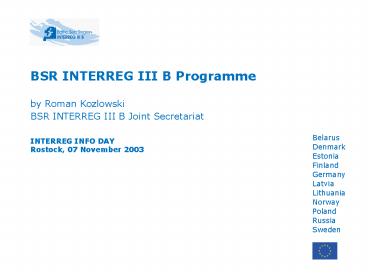BSR INTERREG III B Programme - PowerPoint PPT Presentation
1 / 22
Title:
BSR INTERREG III B Programme
Description:
BSR INTERREG III B Programme. by Roman Kozlowski. BSR INTERREG ... 1.1 SEAGULL strategies for macro regions. Expected outcome. long-term development strategy ... – PowerPoint PPT presentation
Number of Views:60
Avg rating:3.0/5.0
Title: BSR INTERREG III B Programme
1
BSR INTERREG III B Programme by Roman
Kozlowski BSR INTERREG III B Joint
Secretariat INTERREG INFO DAY Rostock, 07
November 2003
Belarus Denmark Estonia Finland Germany Latvia Lit
huania Norway Poland Russia Sweden
2
Content of the presentation
- Programme area
- Programme thematic content
- Programme management
- Programme budget
- Project partnership and management
- Project budget
- Next call for applications
3
INTERREG III B programmes
Transnational cooperation on spatial planning and
regional development
4
Cooperation area
- Denmark
- Sweden
- Finland
- North - East Germany
- Estonia
- Lithuania
- Latvia
- Poland
- Norway
- North West Belarus
- North West Russia
5
Strategic objective
Strengthening economic, social and spatial
cohesion by focusing on disparities between
different territories in order to reach an
increased level of BSR integration and to form a
sustainable part of Europe
6
Programme priorities
Priority 1 Promotion of spatial development
approaches and actions for specific territories
and sectors Priority 2 Promotion of territorial
structures supporting sustainable BSR
development Priority 3 Transnational promotion
of institution building, strengthening the
capacity for spatial development activities
7
Measures in Priority 1
Priority 1 Promotion of spatial development
approaches and actions for specific territories
and sectors Measure 1 Supporting joint
strategies and implementation actions for
macro-regions Measure 2 Promoting sustainable
spatial development of specific sectors Measure
3 Strengthening integrated development of
coastal zones, islands and other specific areas
8
1.1 SEAGULL strategies for macro regions
- Expected outcome
- long-term development strategy
- development programmes for rural areas
- tools for regional development and planning
- tools for measuring environmental sustainability
9
Measures in Priority 2
Priority 2 Promotion of territorial structures
supporting sustainable BSR development Measure
1 Promoting balanced polycentric settlement
structures Measure 2 Creating sustainable
communication links for improved spatial
integration Measure 3 Enhancing good management
of cultural and natural heritage and of natural
resources
10
2.2 SEBTRANS - communication link
- Expected outcome
- strategies for intermodal transport system
- Preparation of investments
- Expansion of labour markets
- Stimulation of business development
11
Ø Transnational studies and
strategiesØ Preparation of
investmentsØ Transnational exchange of
experienceØ Training of professional
staffØ Workshops, seminars, networking,
etc.
Examples of eligible activities
12
BSR INTERREG III B management structure
Monitoring Committee
....
Supervising the programme
Steering Committee
Selection of projects and funding decisions
NationalSub-committees
Investitionsbank Schleswig-Holstein Joint
Secretariat
Paying Authority
ManagingAuthority
S
FIN
DE
DK
N
PL
LT
LV
EST
RU
day to day programme management
BY
Information and support
Projects Lead Partner
Municipalities Regions
ProjectPartner
ProjectPartner
ProjectPartner
ProjectPartner
13
Programme funding
- ERDF funds 120.6 M EURO
- Norwegian national 6.0 M EURO
- Total programme funding 126.6 M EURO
- Committed in 1-4 rounds 48.0 M EURO
- Available after 4 rounds 78.6 M EURO
- including the additional funding from the new MS
14
Partnership (minimum requirements)
- partners from three different countries
- two countries should be financial contributors
- one partner from EU
15
The Lead Partner Principle (example)
16
full financial and legal responsibility for
Lead Partner Principle
- project management system
- submitting Application Form
- signing the Subsidy Contract
- reporting of the project progress
- requesting payments
17
Who can be a project partner?
- National, regional and local public authorities
- Public equivalent bodies
- Public equivalent body means any legal body
- governed by public or private law
- established for the specific purpose of meeting
needs of the general interest, - not having an industrial or commercial character
only, - having legal personality,
18
Who can be a Lead Partner?
- In addition a LPs institution should
- Be financed, for the most part, by the State, or
regional or local authorities, or other bodies
governed by public law, - Or be subject to management supervision by those
bodies, - Or have an administrative, managerial or
supervisory board, more than half of whose
members are appointed by the State, regional or
local authorities or by other bodies governed by
public law.
19
Examples of partners that can apply for funding
from the BSR INTERREG III B
- National, regional and local public authorities
- Ministries
- regional councils
- municipalities, etc.
20
Institutions that could be considered as Public
equivalent bodies
Examples of partners that can apply for funding
from the BSR INTERREG III B (2)
- associations
- academic institutions
- research institutes
- foundations
- NGOs and non-profit organizations
(community-based, humanitarian, industrial,
cultural, etc.) - development agencies, etc.
21
BSR INTERREG III B Project Budget
- 1. ERDF / Norwegian contributions
- up to 75 for Objective 1 regions
- up to 50 for other regions
- 2. National co-funding
- Partners own funding eg. public funds at
national, regional or local level
22
Application rounds
- take place in twice a year (Spring and Autumn)
- till now four calls for project proposals have
already been launched with 49 projects approved
23
Fifth call for main projects proposals
Sixth call is planned to be launched in September
2004.
24
Thank you for your attention!

